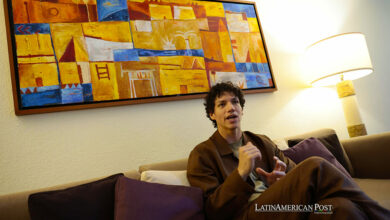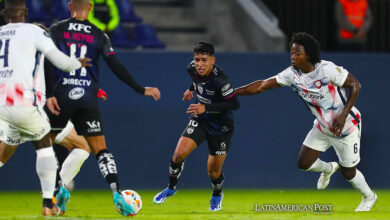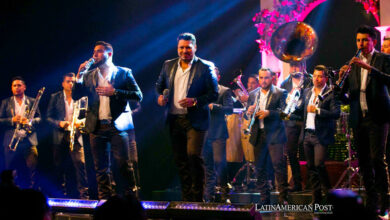The denunciations behind the mega projects for the Central American and Caribbean Games
The regional Comptroller and the citizen oversight fear that the difficult access to sporting venues affects the level of the athletes of the city

The Central American and Caribbean Games will begin on Thursday, July 19, in the city of Barranquilla (northern Colombia). The city will receive most of the sports, except for the cycling that will take place in Cali, since the Velodrome in Barranquilla is not suitable and that of the capital of Valle del Cauca is the only one with the UCI endorsement.
Leer en español: Las denuncias detrás de los mega proyectos para los Juegos Centroamericanos y del Caribe
In total, 13 sports venues will be remodeled or built in this city, among which the construction of the Edgar Rentería baseball stadium, the Raquetas District Park (tennis), the Humberto Perea Coliseum (volleyball), the Aquatic Complex, and the Athletics Stadium stand out. The rest of the scenarios will only be remodeled. For these works, the city invested a value of more than 87 billion Colombian pesos, equivalent to more than 31.5 million dollars.
In March, the progress of the works was 60%, according to the mayor's office. Among these were the completion of the Racket Park, the advances in the baseball stadium and the Elias Chegwin Coliseum. However, scenarios such as the BMX track, which was built in the neighboring municipality of Soledad, had only 15.25% progress, the raquetball stadium only had 35%, and the remodeling of the Metropolitan stadium had progressed by 25.3%. This situation worries several sectors.
What will happen to the scenarios when the games are over?
In addition to the times in the delivery of the scenarios, the community is also concerned with the future of the scenarios, when the games are finished on August 3.
According to Rodolfo Pontón Torres, a member of the Citizen Oversight Committee and a swimming coach, the main problem of sport in Barranquilla is the lack of public scenarios where children, who do not belong to any club or association, can practice individually.
"The Barranquilla sports secretariat does not have training schools or instructors," the only thing they have is an "all to the park" program, explains the coach. For Pontón, football is the sport that has the most places to practice, but other sports such as Karate, Taekwondo, Judo, Swimming, Weights, Cycling, lack these, since "they are private clubs that do sports activities".
The stadium Tomás Arrieta, the former, was administrated by los Rentería (family of the baseball player who played in the Marlins of Florida, Cardinals of San Luis, Giants of San Francisco, among others). "I think they had it in concession for 20 years," says Pontón. The modern soccer stadium had a club association. The public scenarios in Barranquilla are few. The only one is the Olympic pool, which belongs to the Gobernación del Atlántico, but recently they have not had good water management.
The Central American Games’ scenarios and fund management were granted to private institutions such as the Universidad del Norte
According to the viewer, this affects the sports results of the department, something that is reflected in the medals of the last national games, which were played in 2015 in Tolima and Chocó. Atlantic ranked 14th, with only 4 gold, 13 silver, and 14 bronze medals. Three fewer places than in 2012, when it won 8 gold, 5 silver, and 17 bronze medals. In comparison with 2008, the department is located 6 places lower, when it had a total of 49 medals (7 gold, 15 silver, and 27 bronze).
These affirmations of Pontón are reaffirmed by the Regional Comptroller of the Atlantic. Thanks to a document that Latin American Post had access to, the control institution warns that for the Central American Games, it was preferred to grant the administration to private institutions such as the Universidad del Norte, the Altamira School, the Marymount School, among others, instead of investing in public scenarios such as the "Normal La Hacienda" school.
According to the document, "it begins to appear concerns among the sports community, on the destination of sports equipment, because the leagues of sports such as gymnastics, fencing and table tennis, do not have facilities, there are no coliseums to host this implementation and fear that they are lost sports equipment, such as fencing tracks, balls, combat protection elements, tights and gym equipment, among others".
The Comptroller also makes a request for the mayor's office to clarify what will happen in the legal part regarding the non-construction of the velodrome. According to the document, the remodeling of the velodrome was part of the government's plan, and its non-construction could lead to legal problems for the mayor that could end in a recall.
Latin American Post tried to communicate with the managers of the Games, but to date we have not received a response.
The sports community of Barranquilla hopes that after the games, which will begin on July 19, 2018, the city will be able to enjoy this scenarios.
Latin American Post | Santiago Gómez Hernández
Translated from “ Las denuncias detrás de los mega proyectos para los Juegos Centroamericanos y del Caribe”





